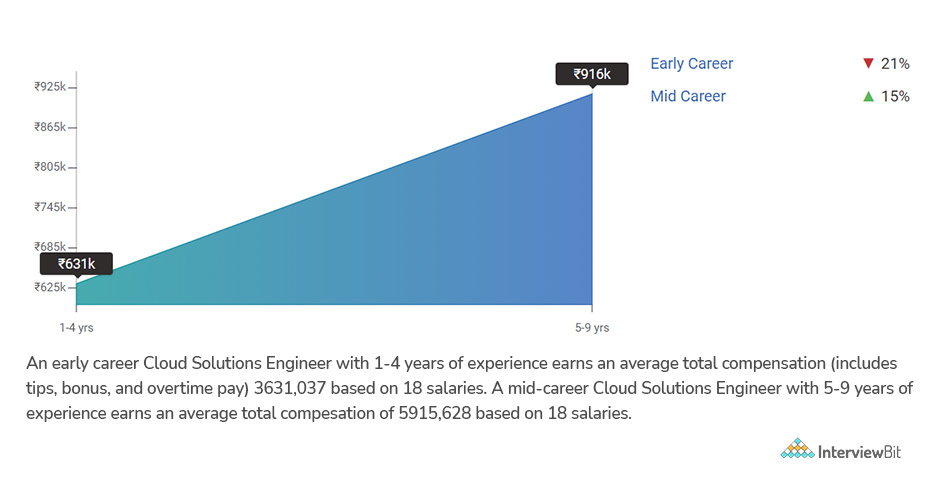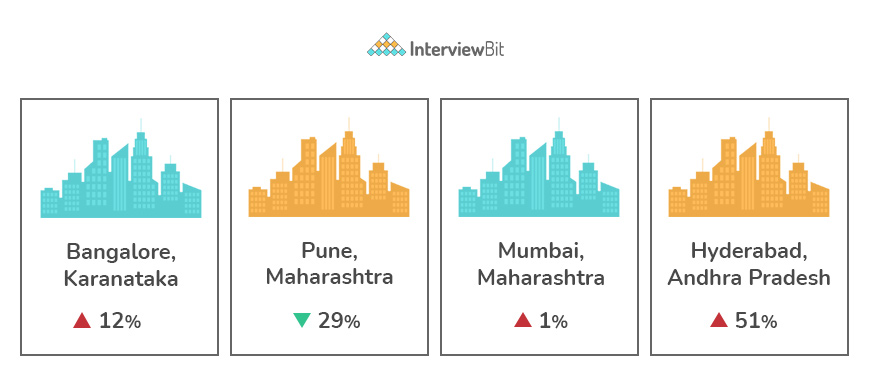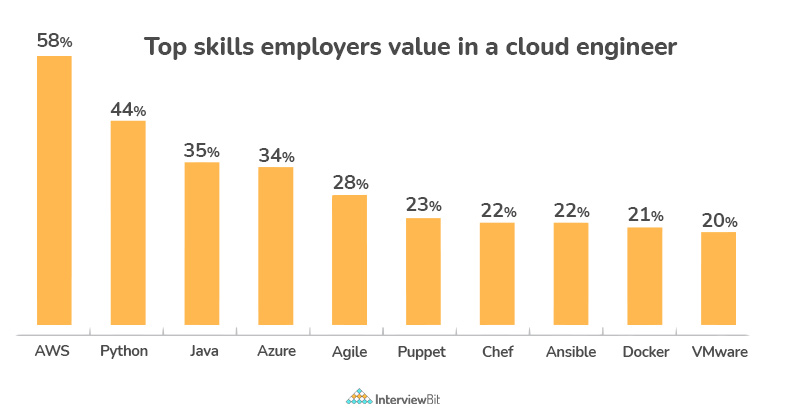- Who is a Cloud Engineer and What Do They do?
- Cloud Engineer Salary in India
- Cloud Engineer Salary Deciding Factors
- Cloud Engineer Job Roles and Responsibilities
- Which Skills Are Required to Become a Cloud Engineer?
- Top Companies Who Hire Cloud Engineers in India
- Cloud Engineer Salary in Other Countries
- Summary
- FAQs
- 1. What is the salary of a Cloud Engineer in India?
- 2. Does a Cloud Engineer need coding?
- 3. Is Cloud Engineer a good career?
- 4. Is cloud technology the future?
- 5. How long does IT take to be a cloud engineer?
- Additional Resources
The cloud computing sector is flourishing as more businesses recognise the advantages of using cloud services in their day-to-day operations.
The worldwide cloud computing market was worth an estimated $266 billion in 2019, according to Grand View Research, and the recent trend toward remote work as a result of the COVID-19 epidemic is predicted to raise cloud usage by another 59 per cent across organisations.
It’s no wonder that people are becoming more interested in cloud computing jobs as a result of this trend. TechRepublic named cloud engineering as one of the most in-demand tech occupations of the year in 2019. Cloud engineering is an appealing career for IT experts who are wishing to change careers as well as beginners starting into the sector, with perks such as good income, the flexibility to work remotely, and much more.
Confused about your next job?
As more businesses are migrating critical operations and processes and applications to public, private, and hybrid cloud infrastructures, cloud engineers—i.e., specialists responsible for reviewing an organization’s architecture and moving distinct activities to a cloud-based system—are in great demand. With a mix of technical abilities, business understanding, and familiarity with at least one of the major cloud providers: Amazon Web Services, Microsoft Azure, and Google Cloud Platform, these people construct, maintain, and connect to cloud services.

Who is a Cloud Engineer and What Do They do?
Cloud Computing has evolved from a “nice-to-have” to a “must-have” technological need in today’s business landscape during the last decade. As a result of this seismic shift, the demand for an IT professional who can oversee the migration process and handle cloud-related duties has skyrocketed.
A cloud engineer is an IT expert who is in charge of all technical aspects of cloud computing, such as design, planning, management, maintenance and supporting a company’s existing infrastructure and investigating alternatives for moving various functions (such as database storage) to a cloud-based system. This person then migrates and maintains the function of the new system.
To complete the migration, cloud engineers must have technical skills as well as the capacity to negotiate terms with vendors, maintain data security, and adopt best practices throughout the process. These specialists also work directly with IT teams to integrate current structures into cloud-based systems and communicate progress to upper management.
The term “cloud engineer” refers to a variety of positions, including:
- Architect for the cloud
- Engineer for cloud software
- Engineer in charge of cloud security
- Engineer for cloud-based systems
- Engineer in charge of cloud networks
Instead of focusing on the technology as a whole, each role concentrates on a unique sort of cloud computing. Cloud engineers are commonly hired by companies that want to deploy cloud services, scale up their use of cloud resources, or improve their cloud knowledge and technology.
Cloud Engineer Salary in India
According to Indeed’s January 2020 study, the average annual income of a cloud engineer in India is around 7.5-8 lakh rupees. This information was derived from a review of 228 salaries provided to Indeed in the previous three years.
Given the rapidly expanding demand for cloud engineers and the scarcity of supply, this is anticipated to increase dramatically in the next few years.
But, once again, this is all subjective. The best approach to figuring out what you’re capable of is to look at cloud engineer salaries in India by job title.

Cloud Engineer Salary Deciding Factors
1. Experience:
As a cloud engineer, your income rises as you progress up the corporate ladder. The better the company you work for, the more likely you are to receive a significant pay raise.
Let’s take a look at the typical cloud engineer salaries based on experience.
| Experience | Average Salary per annum |
| 0-3 years | ₹12,41,000 |
| 4-6 years | ₹17,44,817 – ₹19,00,369 |
In only four years, you can expect to make three times as much as you would as a new employee.
However, not everything in life is simple. You must sharpen your talents and keep up with the current developments in the sector.

2. Location:
In India, the IT hubs include Karnataka, Mumbai, and Tamil Nadu. The demand for cloud engineers may vary by area, which is why compensation for cloud engineers vary by geography. So, let’s look at how much cloud developers earn in these IT hubs.

| Job Location (State) | Average Salary per annum |
| Karnataka | ₹9,14687 |
| Maharashtra | ₹7,19,119 |
| Tamil Nadu | ₹4,27,000 |
3. Job Role:
There are various popular job profiles in cloud-related disciplines, including Solutions Architect, SysOps Engineer, and DevOps Engineer. Cloud engineers with recognised certifications from cloud providers such as AWS, Azure, and GCP are granted these titles.
Each certification focuses on a certain aspect of cloud computing. After becoming a cloud engineer, it’s essentially a speciality.
Let’s take a look at how much each of these cloud engineers makes on average.
| Job Role | Average Salary per annum |
| Solutions Architect | ₹6,46,077 |
| DevOps Engineer | ₹7,13,797 |
| SysOps Engineer | ₹8,35,000 |
4. Skillset:
Salary is influenced by a variety of factors. The most common abilities and their impact on pay are listed below.

| Skills | Average Salary per annum |
| IT Security and Infrastructure | ₹1,228,902 |
| Cloud Computing | ₹894,979 |
| Amazon Web Services | ₹9,00,000 |
| Linux | ₹874896 |
| Microsoft Azure | ₹825043 |
Cloud Engineer Job Roles and Responsibilities

The rise of Cloud Engineers and the way Cloud Computing has evolved over the last few years is nothing short of remarkable. It’s no surprise, that the role continues to gain traction among employers.
The role of a cloud engineer depends on the vertical you service, your position as a Cloud Engineer may change. You can perform the following tasks:
- Engineer for Cloud Security
- Engineer in charge of systems (Cloud)
- Developer for the Cloud
- Architect for the Cloud
- Engineer, Network (Cloud)
The following are the three major categories:
- Architect of Solutions
- Developer for the Cloud
- Engineer for System Operations
1. Architect of Solutions
These are the people who will be involved in the infrastructure and application development. As a result, extensive technical skills and experience in creating distributed applications and systems on the Cloud platform are required. Simply said, they’re in charge of drawing out blueprints for application designs.
Some of their responsibilities are as follows:
- Designing and implementing cloud-based applications that are dynamically scalable, available, maintainable, fault-tolerant, and dependable
- Choosing the right Cloud services to create and deploy an app depending on the requirements
- Using Cloud Platforms to migrate complex, multi-tier apps
- On Cloud Platforms, designing and deploying enterprise-wide scale-able operations
- Bringing cost-cutting measures in place
2. Cloud Developer
The term makes it apparent that these persons are in charge of coding and application development. They are expected to be knowledgeable about cloud architecture best practises. Cloud developers work on cloud-based application development, deployment, and debugging. They should be able to:
- At least one high-level programming language expertise
- Cloud application development, deployment, and debugging skills
- Writing applications requires knowledge of APIs, command line interfaces, and SDKs.
- Knowledge of Cloud Service Providers’ Key Features
- Management of the application life cycle is something that you should be aware of.
3. System Engineer Operations
These are system administrators who assume control of the application after it has been planned and developed. They are in charge of managing and monitoring the majority of the activities that occur during the development process. They should be able to perform the following tasks:
- Worked as a systems administrator in a systems operations capacity with relevant experience
- Experience in monitoring and auditing systems Ability to work with virtualization technology
- Networking concepts (e.g., DNS, TCP/IP, and firewalls) are required.
- Ability to interpret architectural specifications
- Scalable, highly available, and fault-tolerant systems can be deployed, managed, and operated.
- Understand how to implement and manage data flow to and from a service provider.
Which Skills Are Required to Become a Cloud Engineer?

1. Database Skills: Invest time and money into studying a database querying language and platform. Learning programming languages such as MySQL and Hadoop can be really beneficial.
2. Programming Knowledge: Programming languages such as PHP, Java, and.NET are required. Python and Ruby, which are both traditional programming languages, are also in demand.
3. Linux: Linux is an open-source operating system that can be utilised to create technology without the need for authorization. Many modern apps and websites run on Linux. The demand for cloud engineers that can design, administer, and maintain Linux-based servers is growing.
4. Ability to Network: It’s critical to integrate your network with cloud services. Fundamentals of cloud networking are required for cloud computing. Knowledge of virtual networks is required, as is an emphasis on making the process easy for end users.
5. Cloud Service Providers: To succeed in the cloud sector, you must first grasp what cloud service providers have to offer. Learn about cloud services including AWS, Microsoft Azure, OpenStack, and Google Cloud Platform.
6. APIs and Web Services: APIs and web services serve as the foundation for cloud architects. To tag, transport, and describe data, open web services such as XML, SOAP, UDDI, and WSDI are utilised. APIs finish the integration and deploy it on the different platforms.
7. Information Security: Businesses are putting a greater emphasis on data and application security. In cloud computing, it’s critical to keep track on the current state of security and take preventative measures. You’ll get an advantage by learning cybersecurity and acquiring a degree.
Because cloud computing is such a diverse field, obtaining a thorough understanding of the abilities listed above can help you become a good cloud engineer.
Top Companies Who Hire Cloud Engineers in India
Average cloud engineer salaries vary greatly depending on the organisation. Take a peek at the salaries offered by some of India’s most prestigious companies.
| Company | Average Salary per annum |
| Nivio Technologies | ₹18,53,084 |
| HCL Technologies | ₹7,00,000 |
| Microsoft | ₹14,00,000 |
| Adobe | ₹7,60,000 |
| Microland | ₹13,45,871 |
Cloud Engineer Salary in Other Countries
Another key consideration is how much these salaries vary by region. The following is a list of Cloud Engineer Salaries in other countries, organised by location.
| Location | Average Salary per annum |
| Cloud Engineer in New York, NY | $139,440 |
| Cloud Engineer in Boston, MA | $124,803 |
| Cloud Engineer in Chicago, IL | $118,758 |
| Cloud Engineer in Atlanta, GA | $113,709 |
| Cloud Engineer in Austin, TX | $115,084 |
Summary
We observed in this blog article that cloud computing hopefuls have a lot of job options in the cloud business. Learning how to combine analytics and visualisation talents in the cloud will be the icing on the cake for your resume.
Cloud developers, without a doubt, have a bright future ahead of them. With the passage of time, the demand for cloud engineers will only grow. So brush up on your cloud expertise and enrol in our cloud computing course to add certification to your resume!
FAQs
1. What is the salary of a Cloud Engineer in India?
According to Indeed’s January 2020 study, the average annual salary of a cloud engineer in India is Rs 7,51,756. This information was derived from a review of 228 salaries provided to Indeed in the previous three years.
2. Does a Cloud Engineer need coding?
So it’s evident that coding abilities are always an advantage when it comes to Cloud Computing. As previously indicated, platforms like Amazon Web Services, Microsoft Azure, and Google Cloud Platform provide a wide range of services, many of which do not require coding.
3. Is Cloud Engineer a good career?
It’s also an exciting and satisfying field, in addition to the market demand for cloud engineers. DevOps, web security, disaster recovery, containerization, networking, machine learning, and system architecture are all used in cloud engineering jobs.
4. Is cloud technology the future?
Cloud computing is strong and expansive, and it will continue to grow and give several benefits in the future. Cloud computing is very cost-effective, and businesses can use it to expand. Cloud computing has a bright future ahead of it, with benefits for both the host and the customer.
5. How long does IT take to be a cloud engineer?
Cloud engineering is not a position for beginners. On top of a bachelor’s degree in computer science or a similar profession, it takes three to five years of job experience. A master’s degree may be required for some positions. Many jobs also necessitate credentials, depending on the technology they use.







 Join WhatsApp Group
Join WhatsApp Group


